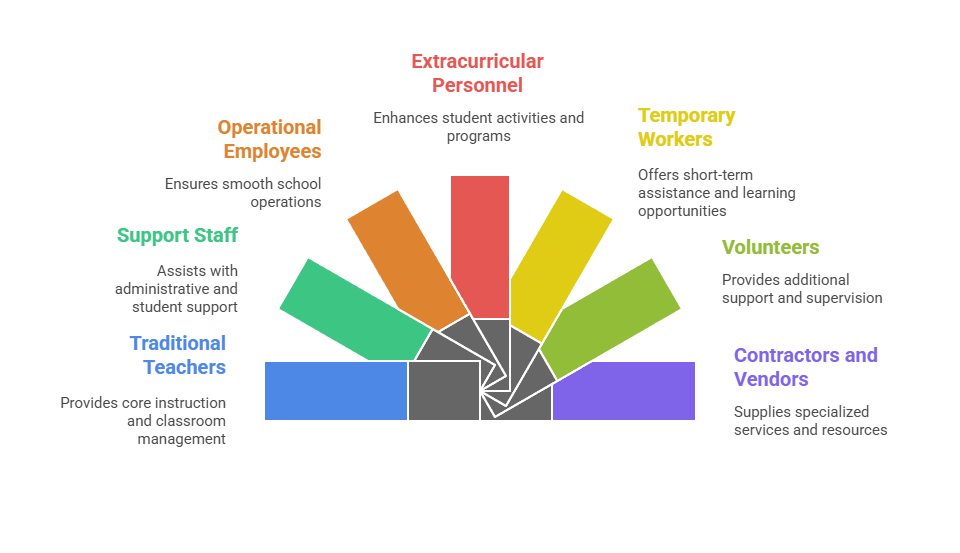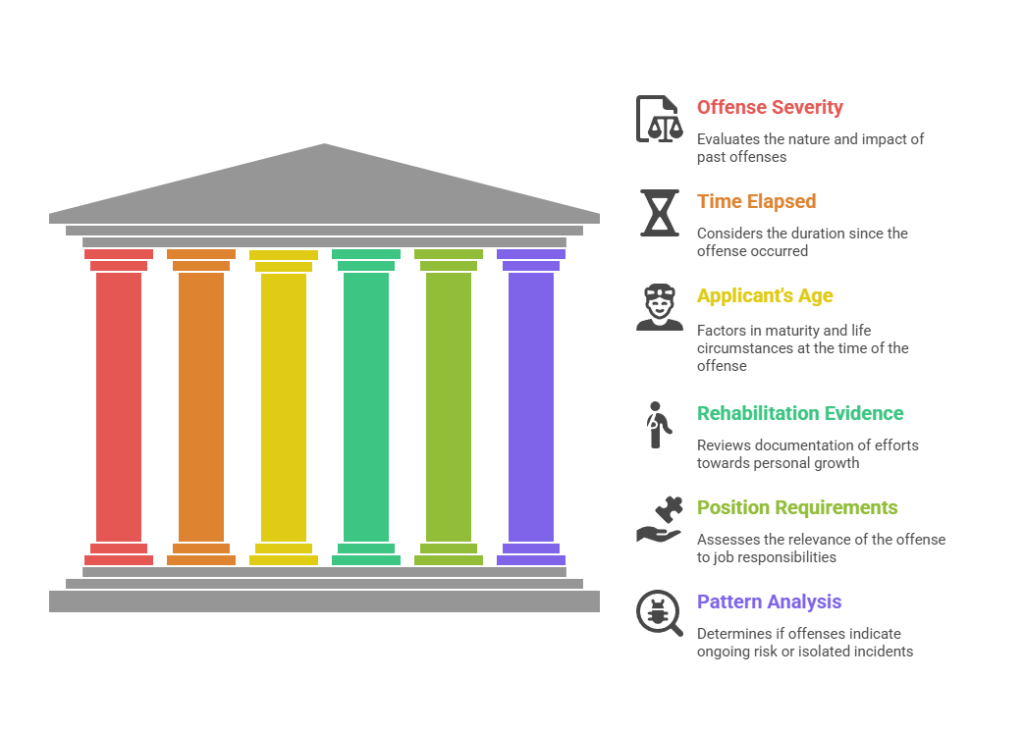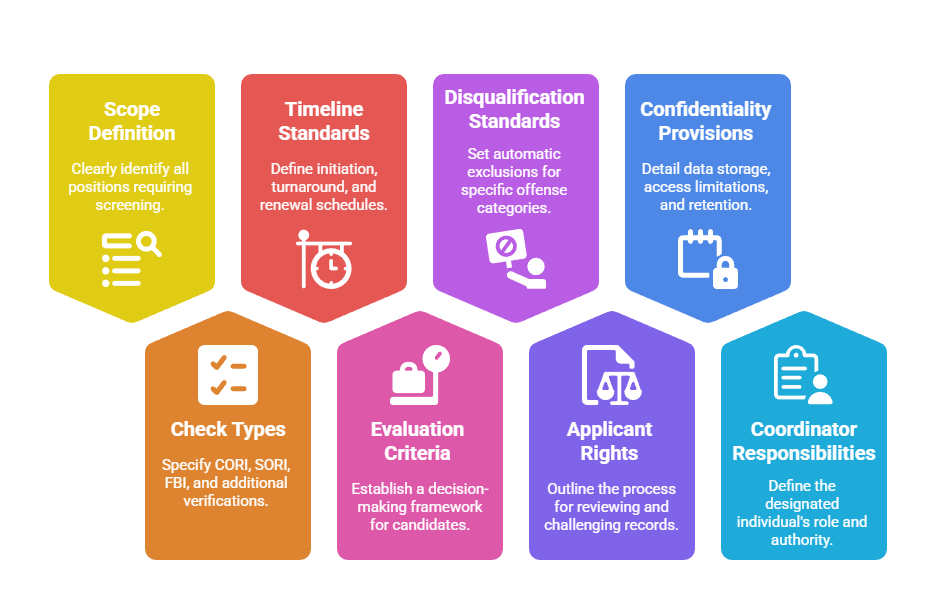Massachusetts mandates a dual background screening system for all educators through CORI (Criminal Offender Record Information) and SORI (Sex Offender Registry Information) checks, making it one of the most comprehensive teacher vetting frameworks in the United States. Private schools and educational institutions must navigate strict state regulations while balancing compliance requirements with efficient hiring timelines, particularly when filling urgent positions like substitute teacher roles.
Key Takeaways
- All Massachusetts educators, including teachers, substitutes, volunteers, and contractors with unsupervised access to children, must complete both CORI and SORI background checks before employment begins.
- The Massachusetts Department of Elementary and Secondary Education (DESE) requires CORI checks to be renewed every three years, while SORI verification must occur annually for continued employment.
- Private schools in Massachusetts can process background screening requests directly through authorized vendors, often achieving faster turnaround times than public school districts that rely on district-level processing.
- CORI checks reveal Massachusetts criminal history only, while national background checks through FBI fingerprinting may be required for out-of-state applicants or certain positions.
- Educational institutions must maintain a documented background check policy and designate a CORI/SORI coordinator responsible for compliance and record-keeping.
- Certain criminal offenses create automatic disqualification from educational employment in Massachusetts, particularly crimes against children or violent felonies.
- The state's rigorous screening requirements apply equally to full-time teachers, part-time staff, substitute educators, student teachers, and volunteers who have direct contact with students.
- Massachusetts schools face significant penalties for non-compliance, including potential license revocation and liability exposure if an improperly screened employee causes harm.
Understanding Massachusetts' Dual CORI/SORI Background Check System
Massachusetts stands apart from most states by requiring two separate background verification processes for anyone working in educational settings. The CORI system accesses the state's criminal offender database, revealing Massachusetts-based convictions, pending charges, and court dispositions. Meanwhile, the SORI cross-references applicants against the state's Sex Offender Registry Board database, identifying registered sex offenders at all classification levels.
This dual-system approach creates comprehensive protection but also introduces administrative complexity that catches many schools off-guard during their first hiring cycles. Understanding how these systems work together helps institutions develop efficient processes. The separation exists because SORI information doesn't automatically appear in CORI results—schools must specifically request both checks to achieve full compliance with state education employment screening requirements.
What Makes Massachusetts Education Background Screening Unique
Unlike single-check systems in neighboring states, Massachusetts educators cannot begin work until both screenings are clear, even for emergency substitute teacher background screening situations. The state's framework leaves virtually no gap in coverage for student protection. CORI checks provide comprehensive Massachusetts criminal history, while SORI verification identifies registry matches that might not appear in standard criminal records.
Massachusetts requires background checks for an extensive range of school personnel:

- Traditional classroom teachers: Full-time, part-time, and long-term substitute instructors
- Support staff: Teacher assistants, administrative personnel, and counselors
- Operational employees: Maintenance workers, bus drivers, and cafeteria staff
- Extracurricular personnel: Coaches, club advisors, and tutoring program coordinators
- Temporary workers: Student teachers, practicum participants, and field placement students
- Volunteers: Chaperones, tutors, and anyone with unsupervised student access
- Contractors and vendors: Any external personnel with regular student contact
This comprehensive coverage ensures consistent safety standards across all educational environments. Private schools hiring international educators face particular scrutiny, as these candidates require both Massachusetts-specific checks and supplementary federal FBI fingerprint-based screening to verify out-of-state and international criminal history.
CORI vs. SORI: Key Differences for Educators
| Aspect | CORI Check | SORI Check |
| Information Revealed | Massachusetts criminal history including felonies, misdemeanors, pending cases | Sex Offender Registry matches at all three classification levels |
| Processing Method | Electronic through iCORI portal | Paper application to Sex Offender Registry Board |
| Typical Turnaround | 24-48 hours | 5-10 business days |
| Renewal Frequency | Every three years | Annually |
| Cost Range | $25-30 per check | Varies by processing method |
| Evaluation Required | Individualized assessment of offenses | Automatic disqualification for registry matches |
CORI checks provide a comprehensive view of an individual's Massachusetts criminal history, including felony and misdemeanor convictions, pending criminal cases, and certain non-conviction data. Educational institutions typically request "Educational Access" level CORI checks, which reveal more information than standard employment screenings. A critical distinction: an individual might have no CORI record but appear in the SORI database if their offense occurred in another jurisdiction before relocating to Massachusetts.
Massachusetts CORI Check Requirements for Educational Institutions

How Schools Obtain CORI Authorization and Access
Educational institutions must first establish their legal right to request CORI information by registering with the Massachusetts Department of Criminal Justice Information Services (DCJIS). This registration process requires schools to designate a CORI Coordinator—typically an HR director or administrator—who completes state-mandated training on proper handling of criminal record information. The coordinator receives login credentials to the iCORI system, Massachusetts' online portal for electronic CORI requests and results.
Schools must adopt a written CORI policy that outlines their screening procedures, decision-making criteria regarding criminal records, and information security protocols. Massachusetts regulations require schools to make this policy available to applicants upon request, ensuring transparency in the Massachusetts education employment screening process. Private schools gain a significant advantage here—once registered, they can submit CORI requests immediately upon candidate selection rather than routing through district-level bureaucracy.
The CORI Request and Review Process
Submitting a CORI request begins with obtaining the applicant's written consent and collecting required identifying information. Schools access the iCORI portal, enter the applicant's information, and typically receive results within minutes to a few hours during business days. The electronic system has dramatically accelerated what was once a multi-week paper-based process.
When CORI results reveal criminal history, schools must follow specific evaluation protocols:

- Offense nature and severity: Consider whether the crime involved violence, dishonesty, or child victims
- Time elapsed: Evaluate how many years have passed since the offense occurred
- Applicant's age at offense: Factor in maturity level and life circumstances at the time
- Rehabilitation evidence: Review documentation of counseling, community service, or character references
- Position requirements: Assess whether the offense directly relates to job responsibilities
- Pattern analysis: Determine if multiple offenses suggest ongoing risk versus isolated incident
Massachusetts law prohibits blanket exclusion policies and requires individualized assessment. Certain serious offenses—particularly those involving child victims, sexual crimes, or violent felonies—typically result in automatic disqualification from educational roles. Schools must document their decision-making process thoroughly, as applicants have the right to challenge CORI information accuracy and appeal adverse employment decisions.
CORI Renewal Timelines and Ongoing Compliance
Massachusetts education background screening doesn't end after initial hiring. State regulations mandate CORI check renewal every three years for all covered employees and volunteers. Many private schools build CORI renewal into their employment anniversary processes, bundling it with performance reviews or contract renewals to ensure nothing falls through the cracks.
SORI Check Requirements for Massachusetts Educators
Accessing the Sex Offender Registry Information System
Unlike CORI checks processed through iCORI, SORI verification follows a different protocol. Schools can conduct basic SORI checks by searching the publicly accessible Sex Offender Registry Board website for Level 3 offenders, but this approach provides insufficient protection. Comprehensive SORI screening requires schools to submit formal requests to the Sex Offender Registry Board to check all three classification levels.
Educational institutions must complete a SORB Application for Sex Offender Registry Information form for each applicant, submitting it with a processing fee. This paper-based system moves slower than electronic CORI processing, typically requiring 5-10 business days for results. Schools often run CORI and SORI checks simultaneously to avoid sequential delays, though both must clear before employment begins.
Annual SORI Verification Requirements
Massachusetts requires educational institutions to verify SORI status annually for all employees with student contact—a more frequent cadence than the three-year CORI renewal cycle. Some institutions conduct annual SORI checks for all staff simultaneously at the beginning of each academic year, creating a predictable compliance cycle and simplifying record-keeping. Others stagger checks based on hire dates, distributing the administrative workload throughout the year.
| Compliance Approach | Advantages | Challenges |
| Simultaneous Annual Checks | Predictable timeline, simplified tracking, batch processing discounts | High workload concentration, potential staffing gaps if issues arise |
| Rolling Anniversary-Based | Distributed workload, aligns with hire dates, easier budget management | Complex tracking requirements, year-round administrative attention |
| Semester-Based Cycles | Aligns with academic calendar, natural planning points | Two annual peaks, doesn't match all hire dates |
Regardless of approach, documentation is critical. Schools should maintain clear records showing when each employee's SORI check was completed, when the next verification is due, and confirmation that clearance was received.
FBI Fingerprinting and National Background Checks for Teachers
Out-of-state applicants who haven't resided in Massachusetts for extended periods need FBI fingerprint-based checks to reveal criminal history from other jurisdictions. Massachusetts' isolated geographic position creates particular risk—a candidate could have serious offenses in New York, Connecticut, Vermont, or other states that CORI simply cannot detect. International educators and teachers on visa sponsorships require FBI background checks as part of federal employment eligibility verification.
The FBI fingerprinting process requires live-scan electronic fingerprinting or traditional ink fingerprint cards submitted through authorized channeling agencies. Massachusetts has numerous fingerprinting service locations that capture prints and transmit them electronically to the FBI for processing against the National Crime Information Center database. Results typically return within 3-5 business days for electronic submissions, though paper fingerprint cards can take several weeks.
Schools can partner with background screening vendors that coordinate the entire FBI fingerprinting process. This streamlines Massachusetts education employment screening by centralizing CORI, SORI, and FBI checks through a single provider. The FBI check reveals arrests and convictions from all U.S. jurisdictions, providing the broadest possible view of an applicant's criminal history.
Private School Advantages in Massachusetts Background Check Processing
Private schools in Massachusetts enjoy significant operational advantages when conducting teacher background checks compared to their public school counterparts. Independent institutions can establish direct relationships with background screening vendors, bypassing district-level bureaucracy and central office processing delays. This direct-access model allows private school HR directors to initiate background checks immediately upon candidate selection.
Key advantages for private schools include:
- Rapid processing: Direct vendor access enables 24-48 hour CORI results versus district delays
- Flexible policy implementation: Ability to exceed minimum standards without collective bargaining constraints
- Vendor selection: Freedom to choose specialists in education background screening
- Technology integration: Access to compliance management platforms and automated tracking
- Proactive substitute pools: Capability to pre-screen substitutes before urgent needs arise
- Streamlined onboarding: Coordinated background checks, reference verification, and credential validation
During peak hiring periods—late summer for fall positions and mid-winter for spring openings—this processing speed advantage can make the difference between securing top candidates and losing them to competing offers. The ability to complete Massachusetts teacher background check requirements rapidly while maintaining full compliance represents a competitive advantage private schools should leverage.
Streamlined Substitute Teacher Background Screening
The unpredictable nature of substitute needs demands rapid background check completion to maintain adequate staffing levels. Private schools with direct vendor access can onboard substitute teachers significantly faster than public districts routing requests through central offices. Many independent schools maintain pre-cleared substitute pools by proactively screening potential substitutes before immediate needs arise.
This forward-planning approach involves recruiting substitute candidates during slower periods and completing all background checks while time pressure is low. When a teacher absence occurs, the school simply contacts pre-cleared substitutes rather than initiating emergency background checks. This strategy transforms substitute teacher background screening from a reactive scramble into a proactive talent pipeline.
Creating Compliant Background Check Policies for Massachusetts Schools
Every Massachusetts school must maintain a written background check policy that meets state regulatory requirements while reflecting institutional-specific procedures. The policy should clearly identify which positions require background screening, specify the types of checks conducted, and establish decision-making criteria for evaluating criminal record information.
Essential policy components include:

- Scope definition: Clear identification of all positions requiring screening
- Check types: Specification of CORI, SORI, FBI, and any additional verifications
- Timeline standards: When checks are initiated, expected turnaround periods, and renewal schedules
- Evaluation criteria: Decision-making framework for candidates with criminal histories
- Disqualification standards: Automatic exclusions for specific offense categories
- Applicant rights: Process for reviewing and challenging record accuracy
- Confidentiality provisions: Data storage, access limitations, and retention periods
- Coordinator responsibilities: Designated individual's role and authority
The policy must address how the school handles adverse information, including the individualized assessment process for CORI results and automatic disqualification standards for SORI matches. Effective policies balance comprehensive protection with fair hiring practices, avoiding blanket exclusions that might violate discrimination laws.
Designating and Training Your CORI Coordinator
Massachusetts regulations require every educational institution to designate a CORI Coordinator responsible for managing the background check program. This individual must complete state-mandated training covering legal requirements, system operation, information security, and proper handling of criminal record data. Many schools designate a backup coordinator to ensure continuity when the primary coordinator is unavailable.
Record-Keeping and Documentation Best Practices
Schools should document when consent was obtained, the date each check was submitted, when results were received, what information was revealed, and how decisions were made. Creating individual compliance files for each employee and volunteer ensures organized, auditable record-keeping. Digital record systems with automated renewal reminders and audit trail capabilities simplify compliance management, particularly for larger institutions.
Common Compliance Challenges and Solutions
Schools occasionally face urgent hiring needs that create tension between speed and compliance. A sudden teacher resignation mid-semester, unexpected enrollment increases, or emergency leaves create immediate coverage requirements. However, Massachusetts law provides no shortcuts—background checks must clear before an individual begins work with students, regardless of urgency.
The solution lies in proactive preparation rather than compliance compromise:
- Maintain pre-screened substitute pools: Build cleared candidate databases before urgent needs
- Recruit during slower periods: Screen candidates when time pressure is minimal
- Partner with specialized vendors: Work with providers who prioritize education clients
- Request expedited processing: Leverage electronic systems for compressed timelines
- Communicate realistic timelines: Manage candidate expectations about start date flexibility
- Build hiring buffers: Anticipate turnover and begin recruitment before positions become vacant
Clear communication with candidates about background check timelines during the interview process prevents misunderstandings. Some vendors offer expedited processing for rush situations, leveraging electronic systems to compress timelines without sacrificing thoroughness.
Handling Candidates with Criminal Records
| Evaluation Factor | Considerations | Documentation Required |
| Offense Nature | Severity, victim involvement, crime category | CORI report details, court records |
| Time Elapsed | Years since offense, statute of limitations | Conviction dates, current age |
| Rehabilitation | Counseling, community service, employment history | Character references, completion certificates |
| Position Fit | Job responsibilities, student interaction level | Position description, supervision structure |
CORI results revealing criminal history create complex evaluation scenarios. Massachusetts law prohibits automatic disqualification based solely on criminal record existence—schools must conduct individualized assessments. The offense nature and severity matter significantly; a 20-year-old marijuana possession charge carries different implications than recent violent crime.
Schools should develop standardized assessment frameworks that guide consistent decision-making while allowing case-by-case flexibility. Engaging candidates in conversation about criminal history, obtaining explanations and rehabilitation evidence, and consulting with legal counsel for complex situations helps schools make defensible decisions.
Tracking Multi-Layered Renewal Requirements
The different renewal cadences for CORI (every three years) and SORI (annually) create tracking complexity that grows with staff size. Without systematic tracking, compliance gaps become almost inevitable. Background screening vendors often offer compliance management platforms that track all employee screening dates and automatically generate renewal reminders.
Working with Background Screening Vendors
Educational institutions benefit significantly from partnering with background screening vendors who specialize in Massachusetts education compliance. Generic employment screening companies may lack familiarity with the state's unique CORI/SORI dual system and education sector best practices. Vendors experienced in substitute teacher background screening understand the urgency schools face and the regulatory nuances.
When evaluating potential vendors, schools should assess turnaround time guarantees, technology platform capabilities, customer service responsiveness, and compliance expertise. The ideal partner offers integrated processing of CORI, SORI, and FBI fingerprinting through a single portal. Vendors providing compliance management tools—renewal tracking, audit reports, policy templates—deliver value beyond basic screening services.
Background screening costs represent an ongoing operational expense that schools must budget carefully. Massachusetts CORI checks cost approximately $25-30 per request, while SORI checks require separate fees. FBI fingerprinting adds costs ranging from $50-75 per candidate. Vendor-facilitated screening typically includes service fees, with comprehensive packages ranging from $75-150 per candidate for complete processing.
Conclusion
Massachusetts teacher background check requirements represent some of the nation's most comprehensive education workforce screening mandates. Private schools that master these dual-check requirements implement efficient processing workflows and maintain meticulous compliance documentation. Success requires understanding not just the minimum legal requirements but also the operational strategies that distinguish compliant schools from truly excellent ones. As Massachusetts continues prioritizing student safety through background screening, educational institutions that embrace these requirements proactively position themselves as employers of choice for quality educators.
Frequently Asked Questions
How long does the Massachusetts teacher background check process take?
CORI checks through the iCORI system typically return results within 24-48 hours during business days. SORI verification requires 5-10 business days as the Sex Offender Registry Board processes paper applications. FBI fingerprinting takes 3-5 business days for electronic submissions. Schools should plan for 7-14 days total to complete all required screenings.
Can teachers start working in Massachusetts schools before background checks clear?
No. Massachusetts law strictly prohibits individuals from beginning employment in educational settings before both CORI and SORI background checks are completely clear. This applies to all positions with student contact including teachers, substitutes, coaches, and volunteers. Schools that allow candidates to work before receiving clearance face significant penalties including potential license revocation and liability exposure.
Do substitute teachers need the same background checks as full-time teachers in Massachusetts?
Yes. Substitute teachers must complete identical CORI and SORI background checks as full-time teachers, with no exceptions or abbreviated processes. The same renewal requirements apply—CORI every three years and SORI annually—regardless of how frequently the substitute works. Schools should proactively screen substitute candidates before urgent needs arise.
What criminal offenses disqualify someone from teaching in Massachusetts?
Any appearance in the SORI database (registered sex offender status) results in immediate disqualification from educational employment. Crimes against children, violent felonies, sexual offenses, and certain drug-related convictions generally disqualify candidates. Lesser offenses require case-by-case evaluation considering factors like offense age, applicant rehabilitation, and position requirements.
How often must Massachusetts teachers renew their background checks?
Massachusetts educators must renew CORI checks every three years and SORI verification annually. These staggered renewal timelines create ongoing compliance obligations that schools must track carefully. The renewal process follows the same procedures as initial screening—obtaining fresh consent, submitting requests, and documenting clearance.
Do Massachusetts private schools have the same background check requirements as public schools?
Yes. Massachusetts background check requirements apply equally to all educational institutions regardless of public or private status. Both must conduct CORI and SORI checks for all employees with student contact and follow the same renewal timelines. However, private schools often process background checks faster through direct vendor relationships rather than routing through district-level bureaucracy.
Can schools access background check information from a teacher's previous Massachusetts employer?
No. Background check results belong to the requesting institution and cannot be transferred between employers. When teachers move between Massachusetts schools, the new employer must conduct fresh CORI and SORI checks even if the previous school screened the candidate recently. Massachusetts law requires new screening for each employment relationship.
What should Massachusetts schools do if a current employee is arrested?
Schools have no automatic notification system when current employees face criminal charges. Many schools include employment agreement clauses requiring employees to self-report arrests, particularly for offenses that would disqualify them from educational work. Schools should conduct a new CORI check if they learn of potential criminal activity and consult legal counsel before making employment decisions.
Additional Resources
- Massachusetts Department of Criminal Justice Information Services - iCORI System
https://www.mass.gov/icori - Massachusetts Sex Offender Registry Board
https://www.mass.gov/orgs/sex-offender-registry-board - Massachusetts Department of Elementary and Secondary Education - Background Check Requirements
https://www.doe.mass.edu/lawsregs/603cmr51.html - CORI and Criminal Background Checks: A Guide for Massachusetts Employers
https://www.mass.gov/service-details/cori-and-criminal-background-checks - FBI Identity History Summary Checks
https://www.fbi.gov/how-we-can-help-you/need-an-identity-history-summary

GCheck Editorial Team
Meet the GCheck Editorial Team, your trusted source for insightful and up-to-date information in the world of employment background checks. Committed to delivering the latest trends, best practices, and industry insights, our team is dedicated to keeping you informed.
With a passion for ensuring accuracy, compliance, and efficiency in background screening, we are your go-to experts in the field. Stay tuned for our comprehensive articles, guides, and analysis, designed to empower businesses and individuals with the knowledge they need to make informed decisions.
At GCheck, we're here to guide you through the complexities of background checks, every step of the way.





